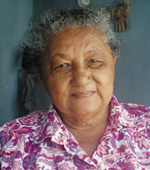 |
Cícera Fonseca da Silva, known as Ciça and the oldest of 11 siblings, was born in 1935 on a smallholding in Juazeiro do Norte. She used to work the land with her parents, and only started working with clay after she got married. “Some of it I inherited from an uncle, João Cândido Lira. I used to help him, and he would teach me. On Sundays we used to paint the pots and at around 1 or 2 am he would place all of them in a basket and we would walk to the market to sell them. It was dark, and sometimes we would trip. The basket would fall and everything ended up broken.”
A hard life, dry in more ways than one, means that Ciça doesn’t know the meaning of giving up. “Life is pretty long isn’t it? I got married and carried on working. My husband used to get annoyed because he saw no immediate results. I had to ask him to be patient. He was looking for work while I was struggling with clay. One day I asked an old man to take me to the market in Crato (CE). Off we went, and I sold my things. My husband was pleased. One day an important couple went to the market, Francisco Xavier and Isabel Pedrosa, and they bought my things. Another day, a man with a beard joked that he wanted a mask that looked like him, to wear at a Carnival party. I liked the idea and made three. It was a huge success at the market. So I never stopped.”
To this day she buys clay and prepares it with the help of her husband and her eldest son. Different faces emerge from her hands. Fantasy and reality take on another dimension on the masks that are now spread all over the world.
“I have 70 grandchildren and 11 great-grandchildren and I’ve created everything, from saints to dogs. If we don’t believe in our own art, who is going to?” |


